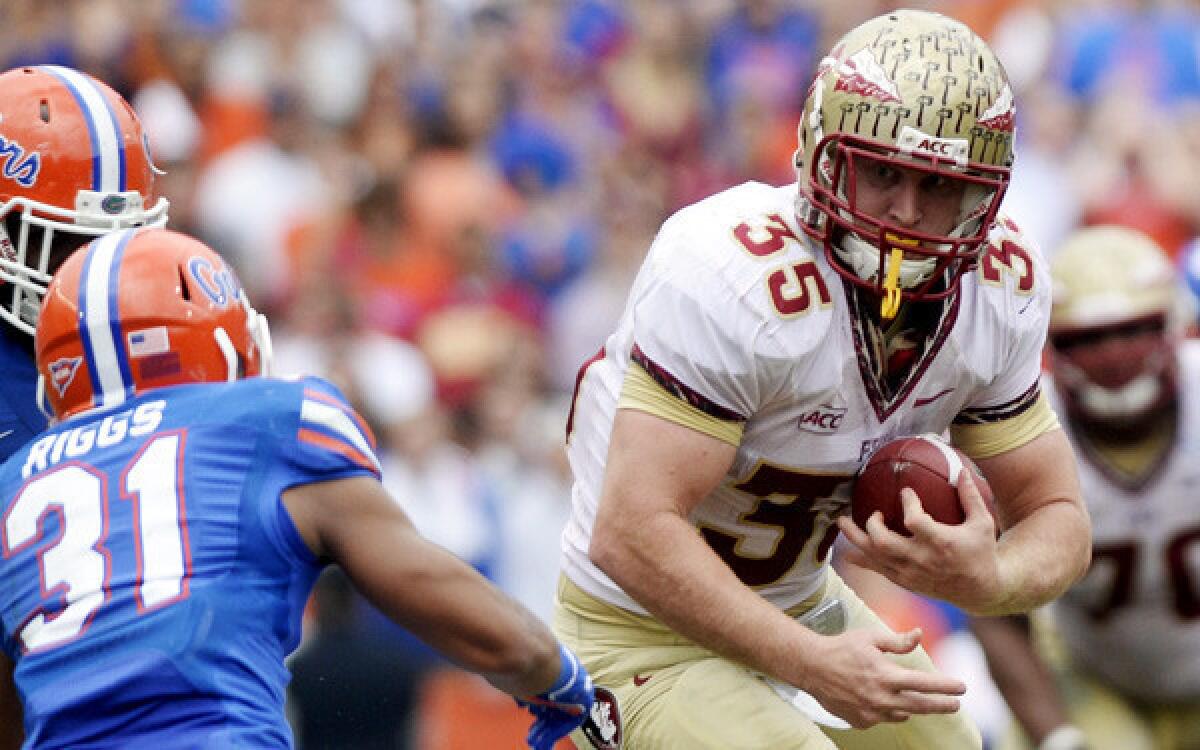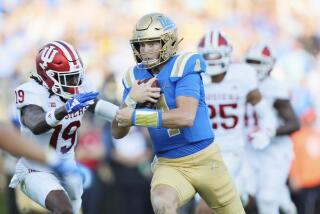Seminoles’ Nick O’Leary has an above-par pedigree

- Share via
In case you’ve been living on Mars and hadn’t heard: Florida State junior tight end Nick O’Leary is the grandson of golf great Jack Nicklaus.
“I mean, it’s just like anything else,” O’Leary said Friday. “Just he played golf for a living.”
Yes, the same way Picasso just painted for a living.
O’Leary, at 6 feet 3 and 248 pounds, is bigger than his granddad and has been a key player in the Seminoles’ run to Monday night’s Bowl Championship Series title game at the Rose Bowl.
O’Leary has 33 catches for 557 yards and seven touchdowns. He’s averaging 16.9 yards per reception.
Unlike most receivers and golfers, O’Leary does not wear gloves. And he said he and Grandpa Jack rarely talk shop when they are together.
O’Leary says he plays golf three times a week in the off-season but never pursued the sport because it conflicted with football.
Can O’Leary play? “When I play a lot I will shoot 74, 76,” he said.
“That’s pretty good,” a reporter responded. O’Leary: “Yeah.”
Asked the last time he out-drove his grandpa on a golf course, he joked, “Last time we played.”
Then and now
First-year Florida State quarterbacks coach Randy Sanders has the distinction of being involved in the first, and last, BCS title game.
Sanders was Tennessee’s running backs coach in the 1998 season when the Volunteers defeated Florida State at Sun Devil Stadium in Tempe, Ariz.
He left Tennessee for Kentucky after the 2005 season and stayed there until joining Jimbo Fisher’s staff this season.
“If nothing else, I’m the answer to a trivia question, right?” Sanders joked.
Sanders, who played at Tennessee and spent his entire coaching career in the Southeastern Conference before joining Florida State, expected to take part in a few title games between now and then.
“When you play in the first one you can’t imagine it would be this long getting back,” Sanders said. “Because we had a lot of good things going on at Tennessee at the time; we had a lot of good football teams.”
You again?
The person most responsible for Jameis Winston’s attending Florida State is Dameyune Craig, the Seminoles’ quarterbacks coach from 2010-12.
Craig left Florida State last year for Auburn, where he is the Tigers’ co-offensive coordinator and receivers coach.
Craig was Auburn’s quarterback in the 1990s and still holds school season records for completions (216) and yards passing (3,227).
“I’m not talking to him this week,” Winston joked Friday. “I deleted him on the phone this week so I wouldn’t call him.”
Winston said Craig is “still one of the mentors in my life, like a father figure to me.”
Longhorn laments
Texas fans have found many reasons to blame Mack Brown for the Longhorns’ struggles in recent years.
First, he lost out on future Heisman Trophy winner Johnny Manziel because, the story goes, Brown wanted him to play defensive back.
Guess which other future Heisman winner loved his recruiting visit to Texas.
“Texas was my favorite time,” Winston said of his visit.
Winston, raised in Alabama, said he grew up a huge Vince Young fan.
“I always wanted to go to Texas,” he said, “but the funny thing was I was an Oklahoma Sooners fan.
“That’s probably why I didn’t get offered to Texas, because I was an Oklahoma fan.”
Getting defensive
Auburn’s defense, statistically, doesn’t stand a chance against Florida State. The Tigers rank 87th in total defense and 38th in scoring defense, giving up 423.5 yards and 24 points per game.
“We have got terrible-looking overall statistics and some of them are not misleading,” Auburn defensive coordinator Ellis Johnson said.
Auburn’s unit will be trying to stop a Florida State offense averaging a nation-leading 53 points per game.
At least the Tigers are better with their backs against the end zone. Auburn ranks No. 8 nationally in red-zone defense. (USC, for what it’s worth, is No. 1.)
The Tigers have given up 34 red-zone scores — 23 touchdowns, 11 field goals — in 48 opponent trips inside the 20.
“We make critical stops at critical times,” Johnson said. “. . . With an offense like ours and a kicking game like ours, it’s been good enough to contribute to our football team and win ballgames.”
More to Read
Go beyond the scoreboard
Get the latest on L.A.'s teams in the daily Sports Report newsletter.
You may occasionally receive promotional content from the Los Angeles Times.











